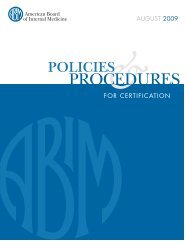The SRA Symposium - College of Medicine
The SRA Symposium - College of Medicine
The SRA Symposium - College of Medicine
Create successful ePaper yourself
Turn your PDF publications into a flip-book with our unique Google optimized e-Paper software.
Papers<br />
Respondents’ evaluations <strong>of</strong> incentives and barriers to research/scholarship were very similar to<br />
their evaluations <strong>of</strong> incentives/barriers to the pursuit <strong>of</strong> external funding. Personal commitment<br />
to research/scholarship, achieving career goals, presenting research findings, likelihood <strong>of</strong> attracting<br />
additional funds and the benefits <strong>of</strong> research to teaching were leading incentives for academic<br />
staff in their pursuit <strong>of</strong> research/scholarship and external funding (Figure 5). Workload issues<br />
(teaching, advising and service), inadequate internal budgets, lack <strong>of</strong> mentoring and collaboration,<br />
excessive requirements to develop proposals and limited time to write proposals were leading<br />
perceived barriers to research/scholarship and the pursuit <strong>of</strong> external funding (Figure 6).<br />
Academic staff indicated in Figure 7 that an institutional policy governing teaching, research and<br />
service and how they are assessed, departmental flexibility with workload and targeted external<br />
funding opportunities would be most beneficial to support their research and funding endeavors.<br />
Mentoring and proposal development support would also be useful to them. Lecturers and<br />
Senior Lecturers reported having the greatest needs in all categories provided in the survey except<br />
targeted alerts. In this category, all Senior Lecturers, Associate and Full Pr<strong>of</strong>essors reported having<br />
equal needs for additional information.<br />
<strong>The</strong> data on research outputs is indicated in Table 4. Most respondents reported publishing 1 to<br />
3 articles in peer-reviewed and other publications before and since 2003. As expected, Pr<strong>of</strong>essors<br />
and Associate Pr<strong>of</strong>essor had the highest publication record <strong>of</strong> about 9 and 4 articles prior to 2003<br />
and since 2003, respectively. Senior Lecturers had 7 and 3 articles prior to 2003 and since 2003,<br />
respectively. Only Lecturers had increased their publication record since 2003.<br />
Focusing on “Development”<br />
<strong>The</strong> low intensity <strong>of</strong> research investment in Botswana is especially worrying in light <strong>of</strong> the large<br />
and widening gap between R&D intensities in developing countries and industrialized countries.<br />
<strong>The</strong> recent findings <strong>of</strong> the Botswana UN Human Development Report for 2005 indicated<br />
that research institutions had failed to deliver and that Botswana needed to re-learn how to build<br />
research capacity. <strong>The</strong>re is therefore an urgent need to find ways to reverse the current trends in<br />
funding for research, as well as more efficiently utilize current funds. <strong>The</strong> proposed research funding<br />
agency – the Botswana Research and Science Funding Agency (BRSFA) is expected to change<br />
the research landscape in Botswana by providing more funding for research that would strengthen<br />
basic and applied research, stimulate innovation, leverage private sector funds and guide science<br />
and technology in the country to achieve human and economic development needs.<br />
<strong>The</strong>re is little doubt that strong public support to research will be needed for many decades into<br />
the future in Botswana. A critical examination is required <strong>of</strong> the workload <strong>of</strong> UB academic staff so<br />
that they are able to devote time needed to conduct research and write grant proposals in order to<br />
meet the criteria <strong>of</strong> BRSFA and deliver quality research outputs. An institutional policy on teaching,<br />
research and service that not only clearly indicates the assessment <strong>of</strong> these categories for career<br />
development, but also the relative importance <strong>of</strong> each for individual researchers. In addition,<br />
a university commitment to mentoring, recognition <strong>of</strong> collaborative research programs and provision<br />
<strong>of</strong> incentives would be required to create a conducive research environment. <strong>The</strong>se needs are<br />
especially critical now in Botswana as public support <strong>of</strong> research through BRSFA is proposed to be<br />
competitive and performance based.<br />
138 2005 <strong>Symposium</strong> Proceedings Book

















